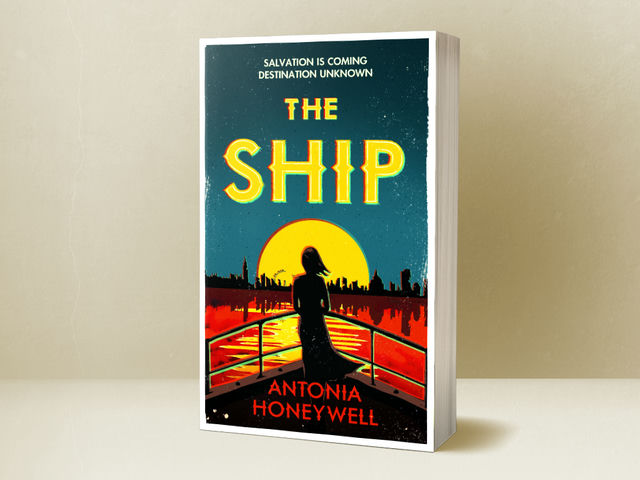The Ship
Antonia Honeywell, 2015

The Ship is Honeywell’s first novel and a powerful debut. Set in the near future, one where the world has burned and civilisation ended, it’s part fable, part warning and part morality tale.
Lalla is a sixteen year old girl who grows up at the end of the world. She lives in a flat in Bloomsbury with her mother Anna and her father Michael. Outside the safety of their flat, London is collapsing, just as other cities around the world are also coming to an end. There’s no more food, and those who remain do whatever they can to survive.
Michael is convinced that he has the answer, a government registration system to ensure that everyone can be saved: the Dove. Only those who are registered can use it to keep updated on food drops and medical aid. But the Dove fails, and society collapses further. Michael has one last plan: fill a ship with food and 500 of the most deserving survivors, and sail away for a new future on the ocean.
Michael works for years to make the dream a reality. His wife supports him in principle, but in practice she’s unable to leave London in decline. She has been trying to help those outside the Dove, and sees it as her purpose. This is the backdrop against which their daughter is raised. By the standards of everyone else, this family is privileged beyond belief. They have shelter, food and water, and the protection of the emergency government.
Lalla grows up with everything she needs until the food shortages become severe. Her mother tries to educate her about the past, by taking her to the British Museum before it is ransacked. But her father would prefer Lalla to be educated about the world she will inherit, not the world that has been lost. Her parents often argue about their conflicting ideologies and it becomes clear that Anna will never leave London on the ship. But a tragedy befalls her, she is shot, and her injury galvanises the departure of the ship and the 500 other survivors. Michael is captain, while Lalla becomes a totem of the hope of humanity.
The story that follows is Lalla’s story of how she grows up on the confines of the ship. Lalla is idealistic and childish, and not wise enough for this collapsing world. But she is the only one on board who doesn’t see the ship as a long-term future. Michael becomes a messianic figure, almost a cult like leader with a God complex. Lalla is dismayed and convinced that no good can come of it. Her decision to rebel is far from what Michael hoped for her, and she becomes the only voice of dissent on the floating utopia.
I enjoyed this novel for many reasons. On one level The Ship is a stark and important warning about the changes that need to be made if humanity is going to survive. Once food production fails, it won’t take long for society to crumble, and with the floods, fires and famine that already affect so many of us, it’s easy to see we’re not far away from the world that Honeywell describes.
I was intrigued by the characters of Lalla and Michael, who are extreme opposites. Lalla believes in hope, while Michael believes in pragmatic certainties. Lalla wants a life that makes her feel alive, while Michael believes the best anyone can hope for is the safety of the ship. These two characters embody the conflict at the heart of the novel and the exploration of this conflict is compelling. As a protagonist Lalla isn’t particularly likeable, but I think that’s what makes the story more interesting, as we watch her grow and make important decisions for her future.
The downside to the novel is that you have to take a lot of fairly unrealistic events at face value, and disregard a certain amount of logic to make it all work. I think that’s OK though: this isn’t about what should be realistic, but what might be believable.
I read this book on holiday in September 2017. Hurricanes and fires were devastating the USA. Floods were rife in India. Impotent political posturing was – and still is – killing people all over the globe. In my hotel I enjoyed a relaxing break with so much food available, and waiters on demand, I wanted for nothing. I found myself living in a metaphor: the hotel was the ship, and outside the world burned. I was very aware of my privilege and was kind of appalled by it.
The Ship is an interesting novel. Not only does it warn us against a possible tragic future, it acts as a wake up call to those of us who have so far avoided such hardship. It’s not often that a novel causes me to check my privilege, but The Ship managed to do it.